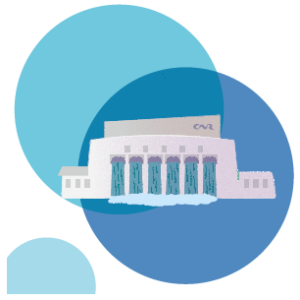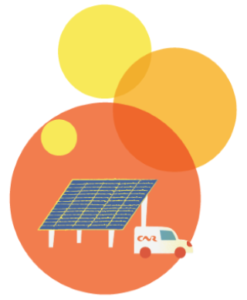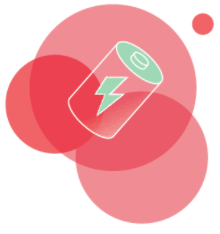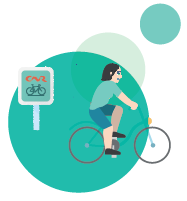A major player in ecological transition, CNR is reinventing its integrated model with its new CNR 2030 strategy to continue supporting the regions over time, developing the Rhône and accelerating its production of renewable energy in France.
CNR 2030 responds to an objective of transformation and development of the company in a rapidly changing world.
CNR 2030 is fully in line with our raison d’être: the Rhône for its origin, the territories for its partners, renewable energies for the future.
CNR 2030 is based on 6 complementary ambitions and a strong CSR base. CNR is therefore committed to carrying out concrete actions for the ecological and energy transition over the next ten years.
6 ambitions for a strong and lasting commitment
In the context of the health crisis affecting our country and its companies, these 6 ambitions are CNR’s contribution to the effort necessary for a green recovery of the economy and constitute a strong and lasting commitment to our stakeholders.
#1 Responsible development of the Rhône and its multiple uses
This ambition aims to carry out the work within the framework of the extension of the concession, to continue our actions in favor of river transport and a reasoned use of the water resource, as well as to sustainably enhance the concession area. Over the next 10 years, CNR will focus on this ambition to:

- Carry out the 500 million euro works program associated with the extension of the concession;
- Invest 165 million euros every 5 years under the master plan injected into the 5Rhône Plans;
- Strengthen dialogue with stakeholders;
- Adapt our operating and maintenance methods to the new hydraulic regimes of the river;
- Bring our knowledge and expertise in the management of the Rhone river in the water resource governance bodies;
- Engage more with agricultural stakeholders who are working towards a more water-efficient model;
- Contribute to a doubling of inland waterway freight transport by 2030, and a 30% increase in passenger transport (yachting and cruising);
- Develop a port offer with local services (infrastructure, ports, quays and services);
- Enhance the value of the concession area by integrating projects serving the energy and ecological transition.
#2 Speed up our production of renewable electricity
The aim is to accelerate the growth and diversification of our 100% renewable production assets, with the objective of quadruple our production capacity outside the Rhône. Installed capacity targeted in 2030: 7,000 MW. This objective implies a growth of 3,000 MW outside the Rhône, ie a fourfold increase in installed capacity outside the Rhône. This increase will be obtained by targeting:

- 1,300 MW developed in renewable energies throughout France;
- 1,000 MWp by enhancing the Rhone’s photovoltaic potential;
- 200 MW by accelerating wind repowering (replacement by more efficient machines);
- 500 MW by applying for competitive bidding for hydroelectric concessions.
- Aggregation objective (energy management of renewable installations) on behalf of producers: 5,000 MW managed.
#3 Develop renewable electricity storage and flexibility
With this ambition, CNR wishes to develop different forms of electricity storage on an industrial scale and thus increase the performance of our renewable energies. In the areas of storage and flexibility, CNR has set itself 3 major objectives for 2030:

- Invest in units for transforming renewable energy into hydrogen by electrolysis of water to be a major player in green hydrogen in the Rhône Valley;
- Develop a first industrial demonstrator for the production of renewable hydrogen by 2025 in order to be able to test the operation of this type of installation in real life and to gradually acquire all the necessary skills;
- Strengthen our ability to aggregate flexibility, that is to say variations in consumption among end customers.
#4 Increase business performance
This ambition aims to develop the performance of the company in all its dimensions: economic, human, organizational, industrial and technical. Performance is essential to continue our development; it addresses many areas and will:

- Improve economic performance through cost control and greater profitability of our investments;
- Successful HR transformations by identifying the skills of tomorrow, implementing targeted training and support actions, developing new professionalization tools and attracting talent;
- Optimize and adapt our production tool and plan our maintenance operations according to the hydraulicity. The objective is to constantly improve our industrial tool and its operating and maintenance methods, which will be based on increasingly uncertain renewable production;
- Make the most of the digital transformation by using all the potential digital levers.
#5 To be the energy company of the future, innovative, at the service of the ecological transition
Our strategy consists of stepping up our innovation actions to consolidate our positioning as an actor in ecological transition. The main areas of our innovation strategy aim to:

- Explore new means of renewable energy production (water, wind, sun): bifacial solar, organic, long-range, agrivoltaic;
- Acquire a global energy management system to manage all our production assets and even better control intermittency;
- Diversify energy recovery by developing an offer of innovative products and services;
- Participate in innovative projects with the territories according to common objectives: supply of local green electricity, self-consumption, electric and hydrogen mobility …
- Strengthen partnerships with higher education establishments, research institutes, start-ups and competitiveness clusters;
- Export our niche expertise in hydroelectric and river engineering.
#6 Support the regions in the climatic and environmental challenges
CNR wishes to act alongside the territories for a sustainable and balanced development, by taking up energy and ecological challenges. This ambition is based on the following objectives:

- Strengthen our actions for biodiversity, restoration and preservation of Rhone environments;
- Sustainable water management: fish crossings and line restoration;
- Preservation of biodiversity;
- Sustainable development;
- Development of environmental knowledge and experiments;
- Allow the regions to benefit from our development, by sourcing local suppliers, by generating employment through support for local sectors and the redistribution of income;
- Develop industrial tourism around our structures;
- Finalize the ViaRhôna and promote its interconnection with other greenways and river tourism.
